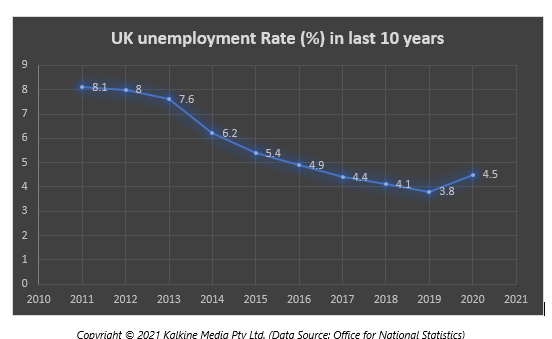Source: Shutterstock
Summary
- UK’s unemployment rate rose 5.1 per cent in the fourth quarter of 2020
- Compared to the third quarter, the number of people looking for jobs increased by 121,000
- Employees on company payrolls increased about 83,000 in January
The Covid-19 pandemic has led the unemployment rate in the UK, rising to 5.1 per cent in the fourth quarter of 2020, government data from Office for National Statistics (ONS) showed. Compared to the third quarter, the number of people looking for employment increased by 121,000, taking the unemployment rate to its highest since early 2016. The number of people having employment fell by 114,000.
Also read: UK unemployment rate at a three-year high
Job losses have been controlled by the Job Retention Scheme announced by the government that is providing support to one out of five employees. The scheme is one of the most expensive support schemes by the government and is set to expire in April. Its cost has been estimated at £70 billion.

The figures assume significance in the backdrop of the UK budget that would be presented on March 3. Prime Minister Boris Johnson has repeatedly promised to support jobs and businesses no matter what it takes. Chancellor of the Exchequer Rishi Sunak is expected to announce in his budget speech the extension of the job support scheme beyond April.
According to the Bank of England’s estimates, the unemployment rate would increase to almost 8 percent with the earlier planned end of the scheme.
Prime Minister Johnson, on Monday, while laying out the gradual exit plan from the lockdown, said that the budget would not pull out the support announced so far, and for the duration of the pandemic, the government would do everything that it takes to safeguard lives and livelihoods.
The hard choices
The Covid-19-induced lockdown led to UK’s GDP contracting by 9.9 per cent in 2020, the largest ever fall. Wage subsidies were providing a cushion to almost 4 million jobs till the end of 2020. Policy experts said that the unemployment data pointed towards the need to extend the furlough scheme.
Employees on company payrolls increased about 83,000 in January despite the restrictions and curbs that were in place, data from tax returns showed. However, the number was still lower by 726,000 since February 2020, before the pandemic happened. Out of those who lost their jobs, about 425,000 were younger than 25.

Copyright © 2021 Kalkine Media Pty Ltd.
Also read: Have the UK hiring intentions improved in 2021?
However, experts said the number of people employed increasing for the second straight month and vacancies continuing to increase, were encouraging trends. The relative improvement in the labour market was due to an increase in the number of full-time employees, which has increased to a record high, experts said.
Though business lobbies and associations have been pushing the government to extend the furlough scheme, economists and finance experts have cautioned the government that the financial implications of un-targeted support could be grave. A study by the Institute for Fiscal Studies (IFS) said that taxes might have to be increased by £60 billion if public finances are not handled carefully.
Small businesses that have felt the biggest brunt of the pandemic-induced economic distress want the government’s support schemes to continue. The chairman of the Federation of Small Businesses, Mike Cherry, said that the figures did not fully reveal the difficult choices that businesses are making and has also requested the government to slash employer’s contribution to national insurance and announce bonuses for companies that retain employees.



